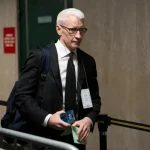
Must every screen endeavor be an eight-episode limited series? The question has become a cliché, but let the record nevertheless show that Apple‘s newest production would have been a perfectly forgettable Tuesday afternoon matinée not so long ago. Or, better still, a CBS special for the home-on-Saturday-night crowd. Instead, Prime Target limps along for the better part of a full-time shift, trailing increasingly unlikely flotsam as it goes. Cambridge math dons, government spooks, think-tankers, Iraqi archeologists: Of course they’re all caught up in a plot to save or destroy the world.
The show follows Edward Brooks (Leo Woodall), a mathematical postdoc at Britain’s second-oldest university. Obsessed with finding a pattern in nature, Edward has zeroed in on prime numbers, believing them to hold not only discovery but the key to civic flourishing.
“The human race has built our whole society on non-primes,” the young man complains to his exasperated mentor. “Sixty seconds in a minute, 24 hours in a day.” Seven days in a week, one is tempted to add? Oh, never mind. Call it the exception that proves the rule.

Because Prime Target is the usual math genius fare, it borrows liberally from previous outings in the field. Edward is a misanthrope and a scold (The Imitation Game). He’s a lonely paranoiac (A Beautiful Mind) who torments a well-meaning professor (Good Will Hunting). Unsurprisingly, our hero is also incapable of speaking or thinking about subjects other than his own. When he learns that a friend is turning 23 years old, Edward responds with the monomania of a devil or saint: “Prime number.” Yes, Pythagoras, as a matter of fact, it is.
Things take a turn when Edward’s tutor (a well-cast David Morrissey) turns up dead after an evening spent discussing his pupil’s plans. Edward’s thesis, we soon find out, has attracted the attention of an NSA branch assigned to monitor European mathematicians. Ensconced in a French villa, agents Taylah Sanders (Quintessa Swindell) and Ricky Olson (Tom Stourton) can access any location in the world, from a Jesus Lane roundabout to the inside of Edward’s flat. Yet they, too, are vulnerable to outside interference. At the end of an early episode, an assassin’s bullet forces Taylah to leap from a Mediterranean quay. Talk about wet work. Though the agent survives, the takeaway is as clear as the Riviera sea. Someone, somewhere, really doesn’t care for prime numbers.
Why such a to-do over an odd series of odds? And what, for that matter, are we to make of the Kaplar Institute, a shadowy research facility that wants to subsidize Edward’s thinking to the tune of 80,000 quid a year? The answer, as Taylah tells a new recruit, is that “math nerds are probably the most dangerous people on the planet.” Having constructed a digital world, advanced societies are helpless against the men and women who can manipulate the digits.
Like most technological narratives, Prime Target says much about the anxieties of the culture that produced it. Watching The Net (1995), audiences glimpsed the end of privacy and the dawning of identity theft, twin obsessions that seemed, during the Clinton administration, like the only threats Americans had left to face. The Jason Bourne movies of the early-to-mid aughts are inseverable from Bush-era concerns about an overweening security state. Is it any wonder, then, that Apple’s latest feels tailor-made for the age of quantum computing and blockchains, fantastical advances by which math threatens to revolutionize whole economies? Finding a “pattern in primes” would allow one to “crack any digital code,” Taylah breathlessly warns Edward. The question isn’t why one government has an eye on the south Fens. It’s why every other government doesn’t.
As for Prime Target’s other plotlines, they are at least as ridiculous. An overachiever in her own right, Edward’s tutor’s wife (Sidse Babett Knudsen) is an archeologist concerned with a recent find in Baghdad. Might the site be the famed House of Wisdom, the seat of Islamic learning as late as the mid-13th century? Flashback scenes, meanwhile, introduce us to Safiya Zamil (Sofia Barclay), an earlier Cambridge student whose own work with primes attracted similarly dangerous attention. As in The Da Vinci Code (2006), a clear influence, ciphers, and “symbology” reign, linking story arcs and giving Edward something to think about when he isn’t fleeing ruffians. Why, for instance, do Safiya’s notes include an icosahedron, an ancient symbol of forbidden knowledge? Ask me again when the men with guns have gone.
Needless to say, none of this is even half-serious, a near-inevitability given the presence of the cheeky, glottal-stopping Woodall in the leading role. In The White Lotus’s fine second season, Woodall played an Essex tough with a lovable joie de vivre, a seductive combination that seemed to announce the arrival of a new star. Here, unable to transcend his previous work, the Englishman smothers the same performance in whinging self-regard. The result is both tedious and repellent, a shame given how much mindless fun Prime Target might otherwise have been. If, as the betting markets have begun to predict, Woodall plays the next James Bond, my advice is to seriously lighten up. It’s one thing to replace martinis and double entendres with pints and rhyming slang. It’s quite another to do so with a frown.
CLICK HERE TO READ MORE FROM THE WASHINGTON EXAMINER
Graham Hillard is an editor at the James G. Martin Center for Academic Renewal and a contributing writer for the Washington Examiner magazine.





